
In an extended 5 minutes with ...
Tim discusses working with the Bredesen protocol, his clinical feedback and some of the latest research for cognitive health.
Tim's details ...
BSc (Pharmacology; Microbiology & Immunology), AdvDip (Nut Med), GradDip Comn
Bredesen Protocol 3.0 Certified Practitioner (Institute of Functional Medicine/ MPI Cognition)
What led you to working with the Bredesen program? Well Alzheimer’s Dementia (AZD) has always been my specific interest, it‘s the reason I began a career in Nutritional Medicine. My father in-law was diagnosed with AZD and I started reading and listening to clinical and therapeutic approaches and I just never stopped reading.
Why Bredesen specifically – well when Bredesen’s first case study paper came out in 2014 (1) it just made sense, it was all the many parts I had read about, you know AZD is T3D, mercury or aluminium causes dementia, infection, inflammation, as causes, this substance has been shown to inhibit neurodegeneration etc but I did not have the Bredesen specific framework that tied the science all together.
I think as Naturopaths and nutritional medicine practitioners we all know or find that most chronic diseases, including AZD, are not one singular disease. The diagnosis is the same but how we might get there is different. The same with T2D or an autoimmune disease – we search and ask "what is your specific trigger?".
With AZD we have different contributors, or as Bredesen calls them, perturbations or holes in the roof of the house with the rain coming in. The problem with AZD is if you plug up a few holes the rain still comes through. This is why it can both be a success and the flip side, why it is also difficult. We must find the perturbations and treat or correct a significant number of them, otherwise we do not get success.
Having said that, the good news is that the vast majority of the treatments are lifestyle and dietary based. Hence Nut Med, Naturopath and functional medicine - they are essentially placed to help with AZD and with most chronic diseases.
What Bredesen suggests is not unique, although he came to his own realisation of the power of a functional root-cause based approache from researching the science and mechanisms for over 25 years. He tells the story that his wife Dr Ida Bredesen (functional MD) said to him early on in this research – “You know Dale, you are not going to find a silver bullet or magic cure, the solutions, plural, are going to come from diet, lifestyle and functional approaches”. Bredesen "yes, yes..." but continued to research to understand what is happening in AZD with the hope of finding that magic cure. Low and behold she was right all along! But it took him decades to find this out, but this is also why it is powerful because it is based in the science.
I personally think we need a paradigm shift in how we see nut med and naturopathy. How we apply what we know are seriously powerful tools, they are just not part of our current medical paradigm and training which unfortunately has been coerced by the money and the power of the pharmaceutical industry.
Don’t get me wrong medicine is powerful for acute trauma and disease and we work with, and alongside, GP’s all the time, but as an endocrine surgeon said to me recently “In my medical training I think we were told we can literally only ‘cure’ 20 odd diseases”. What this really suggests is the rest of the time medicine is only managing symptoms or literally managing disease.
How is your clinical feedback going? As I hinted above, we need to make many changes which is inherently the big difficulty. It is human nature for most to resist change. And I think it is no different to the other clinical work we all do, we all are agents for change, 'health coaches', this a more recent American term and career you may have heard of now.
What is hard is managing all the changes needed to reach 'critical' mass - the plugging up of enough of the holes or correcting enough dysfunction or pathology, and the fact that we are working blind in terms of changes in clinical cognitive symptoms. What I mean by this is it can take time and to make these multiple changes.
We can’t wait and see and say "ok, this change worked and this change didn't". We need all of them to synergise for our ultimate outcome.
Having said that, we are guided by pathology, functional markers and symptoms, that doesn’t change. These are the things that we would routinely track as practitioners, it's just that my template is more extensive.
Without exception we always see great improvements in multiple areas but we are also looking at cognitive improvements which require improvements in multiple systems.
Some examples I have had:
- SR
- MoCA (* see below) 28, so still normal
- ApoE4/4
- Reported a big drop in memory/learning new things (amnestic), word finding (language), calculation and organising (reasoning judgement complex tasks) with statin therapy
- Identified possible gluten intolerance, poor digestion, some degree of dysbiosis
- Implemented keto dietary changes, breathwork changes and addressed nutrient deficiencies (particularly noticed improvements with Citicoline) which resulted in dramatic changes in cognitive function
- PE
- Suffered from dysbiosis & SIBO, with initial indicators of nutrient deficiencies, heavy metal load and slight thyroid autoimmunity
- Reported GERD/burping, stomach pain, gait and balance issues and significant ‘brain fog’ by mid morning
- Low energy, mildly dizzy, with poor memory recall that was impacting work
- Strong family history of AZD
- Our initial low carb, higher fat optimal protein ketogenic dietary changes appear to have dramatically reversed these symptoms
- Still needing some follow up and we may be seeing some degree of bacteria and yeast modulation due to the ketogenic diet. Also meditative practice introduced
- JL
- Found that mercury and biotoxin were major contributors
- Showed significant recovery of executive function, cognitive flexibility and complex attention based on a online computer based neuropsychological evaluation via CNS vital signs
With late stages I currently have had little success but I think this is a lot to do with single carers trying to implement all the changes it becomes very difficult and you also get others not prepared to even keep to diet changes so very difficult to get the outcomes.
Do I think some positive change is possible even with later stages, yes, but the further along someone is there is a real need for a team approach to support all the different facets, and then won’t get back to normal, we will get quality of life improvements, you know someone going from not being able to dress themselves to being able to or not being able to communicate with their partner to being able to, this sort of thing.
I will emphasise that earlier stage and prevention intervention really does fit into what any of AZD researchers talk about including Bredesen - prevention best, the earlier the intervention the better.
This is also why we do what Bredesen calls a ‘Cognoscopy’ a bit like how we get a poop test for bowel cancer when we turn 50.
AZD should be a rare disease, so if there is a family history or you know you have one or 2 copies of the ApoE4 gene, you have big reasons to do something.
Before you could think - why would I want to know my genetic (ApoE4 status), why would I want that sword hanging over my head - but now we have a program showing great success so we have options.
A great example of what one intervention alone can do is exercise, this single intervention can negate the risk of a single copy ApoE4 gene (2).
So we have 2 copies of ApoE either 2/ 3 or 4. One copy of ApoE 4 – 30% life time risk of developing AZD;
2 copies 50% to up to 90% (depending on the study) life time risk of developing AZD, so really something significant to address. So with the 'Cognoscopy' we run the tests, complete a very thorough assessment, and work through what we find.
Montreal Cognitive Assessment (MoCA)
Scores out of a total of 30
Average MoCA for someone with AZD is 16.5 / 30
< 19 AZD proper
Normal > 26 (careful with higher functioning)
19 - 25 Mild Cognitive Impairment (MCI)
19 - 22 start to see daily living difficulties MCI to AZD proper
Is there any recent ground-breaking research to share? We are continuing to see studies confirming the different pathways involved:
- ApoE 4 not only has roles in fat transport and metabolism but can translocate to nucleus, binding the DNA promoter region of around 1700 genes including genes associated with synaptic function, neuroinflammation and insulin resistance. This is quite a dramatic influence (3).
- Discovery of the brain lymphatics, the glymphatics, that are important in brain detoxification when we sleep, specifically deep sleep, so yet another reason why quality sleep plays such a critical role. Bredesen has shown multiple centre cases reporting the success of the program in 100 patients (4).
- Some of the work of Australian researchers led by Professor Ralph Martins on biomarkers for AZD (5), this is fantastic because it potentially gives us earlier detection in the pre AZD stages such as – SCI, MCI which we mentioned before, so we can finally get some early information of who is at risk, this sort of thing.
Where is the research at with brain health and saturated fats?
Here is how I approach this. Our starting point for diet is a ketogenic diet. This is, by definition and practical application, a high fat diet, very low in carbohydrates and having optimal protein.
So the question we worry about is what fat should we eat? Can we eat too much fat, especially saturated fat?
The last 60 or more years we have be told saturated fat is bad, it raises cholesterol and therefore causes CVD, but the research does not and never has really supported this concept. Ancel Keys in the 70’s conducted the 7 country study, which was really 15 countries as he just excluded the anomalies. Therefore, if we are thinking scientifically, we should say this hypothesis must be incorrect because of these anomalies (I think he called them paradoxes).
Even in the last couple months there has been a review by Astrup et al (6) from Ron Krauss’s group analysing the whole body of studies and meta-analysis of the randomised control trials and observational studies and again they are telling us there are "no beneficial effects of reducing saturated fat intake".
We also have the initial work of Gary Taubes (7) and more recently Nina Teicholz (8) that has given us a fantastic overview of the history and science. Nina certainly dug into the actual lack of evidence for our current dietary guidelines.
We also see studies such as Saslow et al (9) and Phinney et al (10) from Virta Health, publishing their initial data with greater than 70% success rates for reversing T2D. If there was a drug that even gave a fraction of this success it would be a blockbuster money earner for the pharmaceutical industry.
We have gone off topic... ketosis and ketones give us a number of things such as
- Increased numbers and efficiency of mitochondria
- Bypasses dysfunctional bioenergetics processes
- Provides an efficient energy source for certain types of neurodegenerative diseases characterized by focal brain hypometabolism
- Increases in nerve growth factors, SIRT 1 and iNOS
- Reductions in inflammation (NFkB), ROS production and apoptosis - a benefit for neurons
- Enhances ATP production
- Increases insulin and leptin sensitivity
As Bredesen practitioners we are actually hedging our bets too. We say get into ketosis first and foremost, if we are still concerned about CVD then why don’t we measure LDL particle number or oxidised LDL levels and think about what the fat composition could be. We can move towards greater mono-unsaturated and whole food omega-3 content in the diet. This should give us a reduced LDL particle number which is associated with CVD risk.
I personally see context is THE critical factor, with insulin resistance being the key problem with CVD. What I'm suggesting is seen in the presence of higher LDL if you are insulin sensitive (i.e. low trigs, high HDL as a quick indicator). In this case you will be at no or low risk of CVD or artherosclerosis progression. We also need to focus on other factors such as inflammation, blood pressure etc but these are often associated with insulin resistance or metabolic syndrome anyway. The insulin story comes from the work of Dr Joseph Kraft and Dave Feldman and others putting the pieces together.
If we address the factor of insulin sensitivity by optimising total levels of insulin secretion with the strategic use of meal macro-nutrient composition, meal timing and fasted periods, does LDL particle number remain a problem? My feeling is that it it is no longer an issue.
We are still waiting for the research but there is certainly no research indicating that in the context of low trig and high HDL (insulin sensitivity markers) that LDL is an issue.
What are your top 3 things in your experience that makes the program a success? I would say investigating very thoroughly, not leaving any stone unturned -find the perturbations or contributors. The completeness of the program to stop progression and rebuild networks – this is about what we implement based on what we find, and always includes the foundations such as diet, exercise, sleep, stress management and brain training.
Secondly, exercise and brain training also fit into the rebuilding of neural networks, using the plasticity of the brain to allow the rebuilding of function that might be lost again. And yes, as above, we can see certain see things that are greater parts of the problem but we still treat everything we find, we try not to leave anything out. Depending on how much the amyloid theory of AZD holds up – with Beta-amlyoid production it is actually a self-amplifying, positive feedback loop. This is one of the reasons we need to do so much to turn the ship around.
Thirdly, team support is critical – a doctor for BHRT ![]() , exercise physiologist/personal trainer, family help, funding (NDIS
, exercise physiologist/personal trainer, family help, funding (NDIS ![]() ) and people like me as your health advocate - your manager of change. This health coach concept and health coordinator is important to keep ticking the boxes to make sure we are optimising everything.
) and people like me as your health advocate - your manager of change. This health coach concept and health coordinator is important to keep ticking the boxes to make sure we are optimising everything.
Thank you for your time Tim.
For more information on Bredesen Protocol in Australia, see Tim's website Reversing cognitive decline






